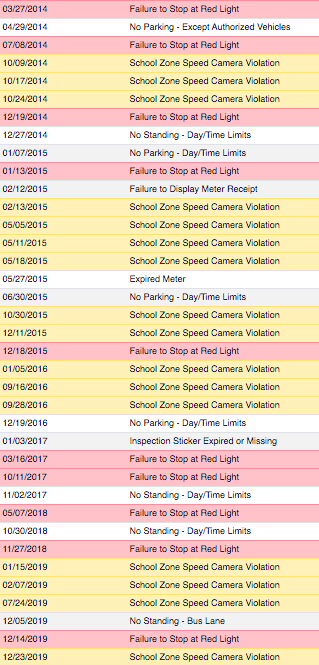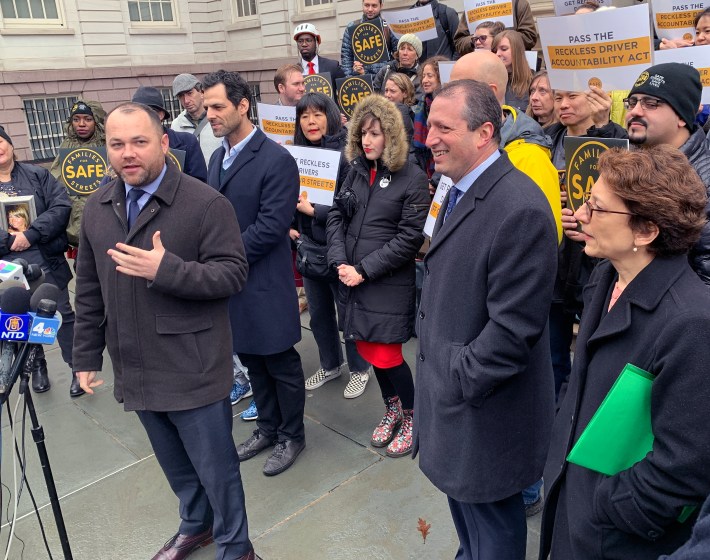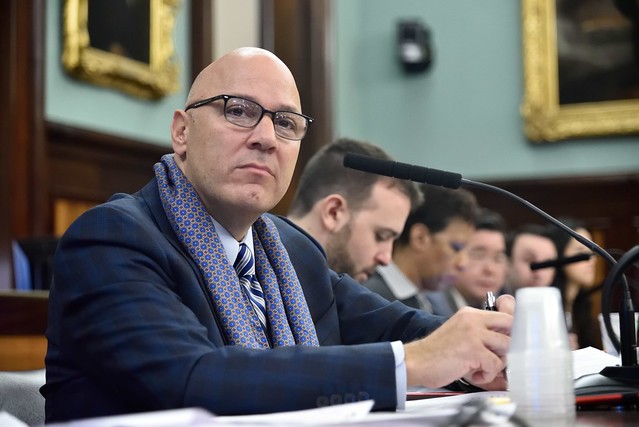One of the five members of the City Council who voted against a landmark street safety bill on Tuesday is himself one of the most reckless drivers in the city of New York.

Queens Council Member Paul Vallone voted "no" on an overwhelmingly popular bill that will require drivers with five camera-issued red light tickets or 15 camera-issued speeding tickets in any 12-month period to take a safe-driving course or have their car seized by authorities. After the vote, Vallone got into his Dodge muscle car with the vanity plate PAVLAW and put more mileage on a history of dangerous driving that may soon subject him to the very law he rejected.
Vallone's car has been nabbed by cameras for 10 red light tickets and 16 speeding tickets since March 27, 2014 — five of them in 2019 alone (see all the tickets, right).
Vallone did not explain his no vote to his Council colleagues, nor did he respond to a request for comment from Streetsblog.
And however bad Vallone's driving record is, he is not currently at risk of having his car impounded under the provisions of the Brad Lander-sponsored bill that passed the Council by an overwhelming 41-5 vote on Tuesday. The bill only requires drivers to take the safe-driving course if they accumulate the required red light or speed camera tickets in any 12-month period. The most tickets Vallone has received in any 12-month period is four red-light tickets and four speeding tickets between March 27, 2017 and Feb. 13, 2015.
He also received three red-light tickets and seven speeding tickets between July 8, 2017 and May 18, 2015.
Perhaps he is improving as a driver, however. Last year, Vallone "only" got four speeding tickets and one red-light ticket — still making himself one of the worst one percent of New York City drivers, according to public data crunched by Jehiah Czebotar and Brian Howald.
Vallone's silence on the issue of his driving record is in stark contrast to his former colleague and current Public Advocate Jumaane Williams, who made headlines last year when the Daily News and Streetsblog discovered that he had 27 moving violations on his record, dating back to 2013.
Williams has apologized for his driving record and has dramatically decreased his infractions. He has received one speeding ticket since Oct. 12, 2018. In his own remarks on Tuesday, Williams drew attention to the value of bad publicity — and the power of the safe-driving course he voluntarily took.
"It's a point that's been made quite publicly in the papers, my indiscretions with speed cameras, and rightfully so, because none of us is above the law," Williams said in his role as overseer of the Council's regular meeting. "I became defensive when Council Member Lander brought it up to me, [so] I actually took the course, and I found it very impactful. And I know the people who took the course with me found it impactful as well.
"It's good course, so I'm congratulating the Council for doing something that I know, based on the numbers, is a great start," Williams added. "And as we move forward, we can expand it and keep our streets safe."
It's not just a hope for the future, but for the present, too. The Department of Transportation recently revealed that vehicles with five or more camera violations are almost twice as likely to be involved in an injury-causing crash. And drivers who've racked up 10 or more violations are nearly three times as likely to cause such crashes.
Vallone was joined by Council Members Joseph Borelli, Barry Grodenchik, Steven Matteo and Eric Ulrich in voting no on the bill, now called the "Dangerous Vehicle Abatement Program." None of the "nay"-sayers publicly explained his vote on Tuesday.
(Of course, it is unclear whether Vallone was driving when his car was slapped with the camera-issued moving violations. But that's exactly the point of the Lander bill that he rejected — it holds the owners of the most-summonsed cars responsible for the danger caused by their cars, whoever is driving them.)
The no votes did little to dampen the enthusiasm that advocates, Speaker Corey Johnson and Department of Transportation Commissioner Polly Trottenberg had for the bill, which Mayor de Blasio has promised to sign.
"We know that the speed cameras have changed behavior — they slow drivers down, they make our streets safer," she said. "This is taking that next step."

But even some supporters remain convinced that the de Blasio administration could have done more. The originally proposed bill, after all, would have triggered enhanced enforcement for drivers who were nabbed for just five red light or speeding tickets in 12 months, which might have ended up nabbing 100,000 drivers every year, once all of the city's speed cameras are installed by the end of this year. Administration officials said they did not believe they could implement a safe-driving course — and impounding the vehicles of people who skip the course — for so many people, so the bill was rewritten to cover what the city believes will be roughly 5,000 drivers.
"I have huge issues with the whole capacity conversation," Council Member Antonio Reynoso of Brooklyn told Streetsblog after the vote. "We had to work [to] his capacity instead of doing more to address a crisis. We did only what was within 'capacity.'" In earlier comments before his colleagues, Reynoso called the mayor "obstructionist in nature when negotiating these bills."
"I do think we could have done better if we had a more willing partner in the mayor's office," he added.
Trottenberg defended the negotiations on the grounds that the worst drivers will still be caught and the program will actually work.
"We are installing 60 speed cameras per month, which will give us the largest speed camera system in the world," she said. "We wanted to be careful that we weren't promising a program that we couldn't deliver and a program that we can run well. We felt strongly, given that this is the first of its kind, we didn't want to promise we could promise tens of thousands of drivers, be tied up in court and not do a good job."






